Netanyahu Vows Not To Allow A Nuclear Iran 'With Or Without Help'

Israel will not allow Iran to obtain nuclear weapons, with or without help from others, Israeli Prime Minister Benjamin Netanyahu told local media on Thursday.

Israel will not allow Iran to obtain nuclear weapons, with or without help from others, Israeli Prime Minister Benjamin Netanyahu told local media on Thursday.
As Iran and all its allies and proxies in the region marked the Quds Day, a designated day to support Palestinians and condemn Israel, Netanyahu told Israel’s channel 14 in an interview that the issue of Iran’s nuclear weapons depends on him and he will not allow it.
His statement about preventing Iran’s nuclearization “With or Without help from others”, presumably referring to a possible role by the United States, echoed a statement by former Israeli National Security Advisor Yaakov Amidror, who said on Thursday, “We need to prepare for war. It’s possible that we will reach a point where we have to attack Iran even without American assistance.”
Iranian media widely reported Amidror’s statement on Friday, as the Islamic Republic’s various government institutions pushed to get a big turnout during the Quds Day, anti-Israeli marches.
Fars news agency affiliated with the Revolutionary Guard recycled past statements by the Supreme Leader Ali Khamenei, saying that when Iranian officials call for the “eradication of Israel” they do not mean the Jewish people, but the current state of Israel.
Eradicating Israel, Khamenei was quoted as saying means “The Palestinian people, who are the real owners of that land, whether Muslim, Christian or Jewish electing their real government…and expelling thugs such as Netanyahu” who are foreigners.
Khamenei, his loyalists and government-controlled media in Iran have been claiming in recent weeks that end of Israel is near, after Israeli protests against Netanyahu and Palestinian terror and rocket attacks.
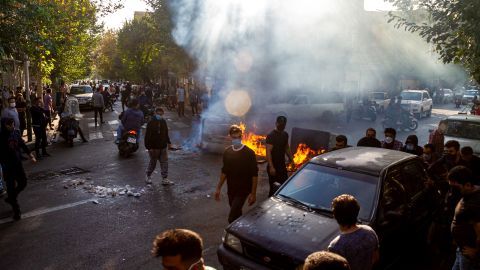
A Twitter account dedicated to news about protests in Iran has released a batch of death certificates of those killed by security forces.
The activist account 1500 Tasvir, which runs popular Instagram and Twitter accounts, started uploading the documents on Wednesday.
The account also published a large batch of harrowing photos and videos of people shot or killed by the regime late in March, saying that such documentation must remain forever in the country’s history.
The cause of death for hundreds of people who died during the protests of "Women, Life, Liberty” movement is stated as "unknown", and the death certificates of dozens of others attested the use of "live fire and bullets" as the cause of death.
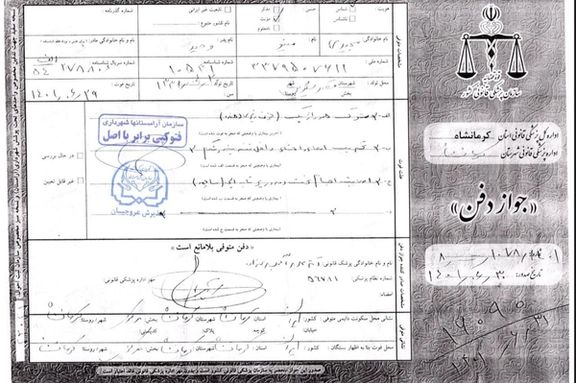
Other causes of death mentioned in the certificates are ruptures of veins or blood vessels, crushing of the skull, hemorrhagic shock (loss of a large volume of blood), and severe tissue damage, all of which point to injuries caused by the security forces’ bullets and batons.
In several cases, the words live fire or bullet are intentionally avoided and replaced by alternative terms such as "accelerated metal projectile" or “metal object."
There are several cases in which the cause of death is declared as “unknown” despite testimonies by eyewitnesses who were present at the scene and directly testified otherwise. These include the cases of Mehrshad Shahidinejad and Sina Malayeri, two protesters who were beaten to death by batons during rallies in the city of Arak according to eyewitnesses.
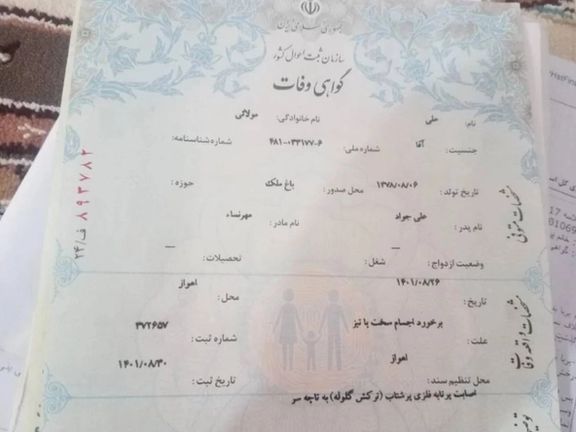
In one of the certificates published by 1500tasvir, the cause of the death of Behnam Layeghpour was declared as “violence by other protesters” despite his family's account of the incident. Layeghpour was reportedly shot two times in his throat and chest from close range in October as his fiancée was watching. A security agent stood over him and prevented people from helping him at gunpoint.
Human rights sources have reported the death of over 500 protesters, including about 70 children, during nationwide protests sparked by the death of 22-year-old Mahsa Amini in the custody of hijab police in September 2022.
There are no official reports about the number of casualties but several rights groups, such as the US-based Human Rights Activists News Agency (HRANA), have put the death toll at way more than 500.
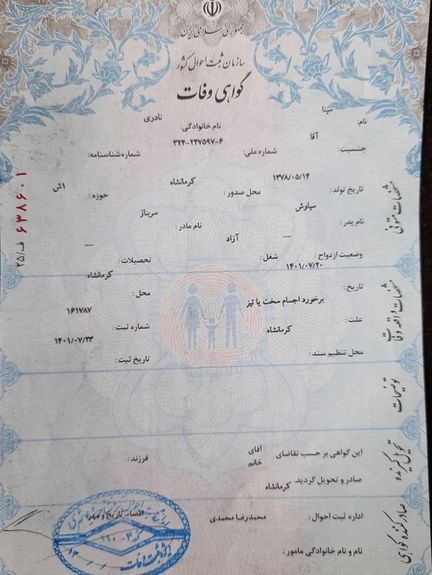
In addition to the people who were killed during the regime’s crackdown on street protests, the Islamic Republic has also stepped up its executions in the past several months.
Iran Human Rights organization and the ECPM (Ensemble contre la peine de mort or Together Against the Death Penalty) released on Thursday their latest annual report on the death penalty in Iran, revealing that 2022 had the highest annual number of executions since 2015. At least 582 people were executed, an increase of 75 percent compared to 2021.
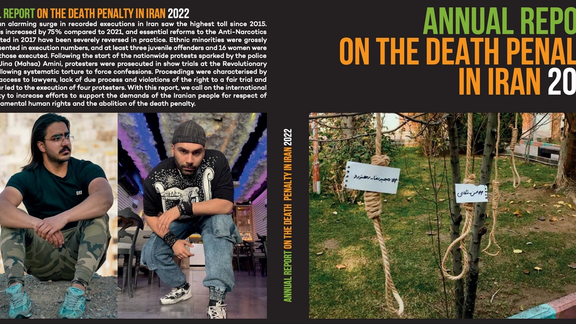
The report said that in 2022, the Islamic Republic’s authorities “demonstrated how crucial the death penalty is to instil societal fear in order to hold onto power,” adding that 88 percent of all executions (511), were not announced by the regime.
According to the report, at least 15 people, among them two protesters, were executed for security-related charges. It also claimed that hundreds of protesters were facing show trials at the Revolutionary Courts, many with charges punishable by death.
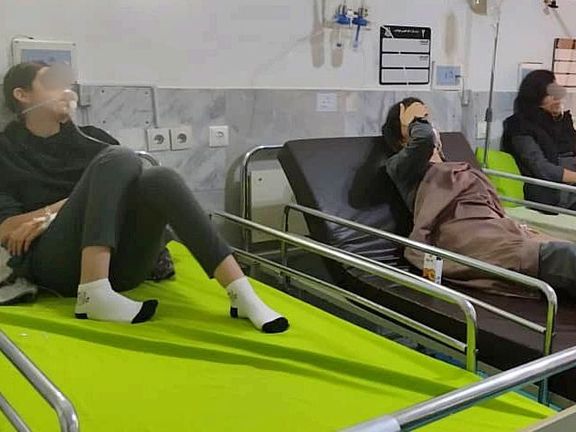
A group of influential Iranians have urged international bodies to probe chemical attacks on schoolgirls, describing them as a "crime against humanity."
In a statement published Thursday, well-known lawyers and filmmakers said that the attacks since November had affected about 13,000 Iranian schoolgirls by March 21, adding that human rights activists should raise awareness about the issue so that international judicial institutions put it on their agenda.
Prominent lawyers Ramezan Hajimashhadi, Giti Pourfazel, Saeed Dehghan, Mehrangiz Kar and Nasrin Sotoudeh as well as award-winning director Jafar Panahi and actress Katayoun Riahi were among the signatories of the statement.
Pointing out that while government security forces were efficient in identifying and arresting protesters, they have shown negligence in pursuing the perpetrators of the chemical attacks, which indicates that they are in line with the regime’s agenda.
Attacking schools is "a kind of threat and revenge against young girls and teenagers who have been striving to end the compulsory hijab through the 'Women, Life, Freedom’ movement.”
Close to 300 schools were targeted in the past Iranian year ending on March 20 without any apparent effort by the government to seriously pursue the perpetrators or explain to terrified parents and students what was happening in so many schools.
Thousands of students have been affected, mostly girls, with hundreds more hospitalized with symptoms including respiratory distress, numbness in their limbs, heart palpitations, headaches, nausea, and vomiting.
While there was lull in attacks as schools closed for the Nowruz holidays, fresh incidents took place this week as students returned to classrooms.
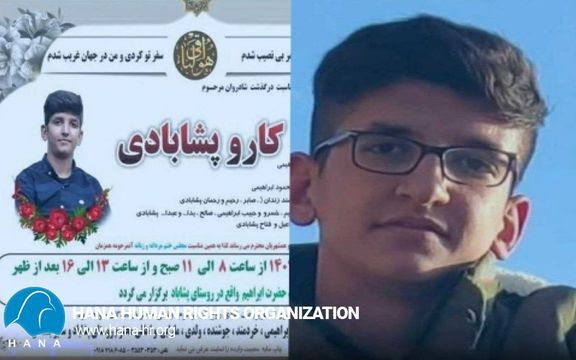
The signatories also referred to the death of a Kurdish teenager who was hospitalized following one such attack, saying that despite the continuation of these chemical attacks, international institutions have not yet taken effective and deterrent actions.
Amid intensified measures to enforce hijab laws, Iran's regime is facing fresh protests over a renewed wave of chemical attacks on schoolgirls and economic woes.
The attacks coincided with the funeral of a Kurdish child from the city of Kamyaran who was laid to rest in Pashavah village in Kordestan province. The 16-year-old boy, Karo Pashabadi, had been taken to hospital for treatment on March 15 after inhaling poisonous gas after a chemical attack on a school in Tehran, where he was living. At least one other child, 11-year-old Fatemeh Razaei, has died in the attacks which began on November 30 and have taken place in hundreds of schools nationwide.
Ordinary Iranians have been suspicious of the involvement of the regime itself, or religious extremists protected by the regime, calling the attacks “state terrorism,” although the regime has denied responsibility and even staged arrests of suspects after widespread protests. Popular belief is that such large-scale and coordinated attacks cannot happen without the green light of regime authorities.
Moineddin Saeedi, a member of the Iranian Parliament from Chabahar in Sistan-Baluchistan Province, criticized a police move to use traffic cameras to identify women removing hijab. He said, "If these cameras can detect crimes to such an extent, why are we currently facing the poisoning of girls?"
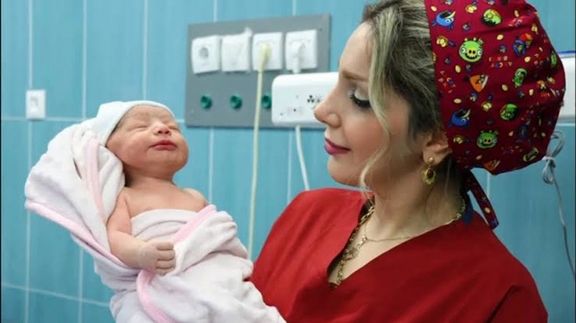
Iran’s Health Ministry has once again warned about the negative consequences of preterm birth, saying that hospitals and surgeons should not deliver babies on the dates the parents wish.
In recent years, there is a growing trend in Iran to go for preterm cesarean deliveries on dates considered to be a "good omen."
On the "magical date" of 2/2/2 in the Iranian calendar year 1402, next week, maternity hospitals and clinics may witness heavy traffic like the previous years.
Apparently, according to numerology, the magic number is loaded with good omens, including wisdom and an abundance mindset that attracts opportunities for all born on 2/2/2.
Hundreds of pregnant women in Tehran rushed to clinics and hospitals to deliver their babies on the "luxury" magical date of triple 1, i.e., 1/1/1 last year.
Deputy Health Minister Saeed Karimi in a letter on Thursday warned about the bookings for caesarean section this year threatening that the hospitals and doctors who do not follow the rules will be punished.
According to experts, performing an early cesarean delivery will increase the risk of respiratory infections, lung and digestive problems in the babies and even may lead to death.
The rate of Cesarean section deliveries in Iran is almost 55 percent, which is three times the global average.
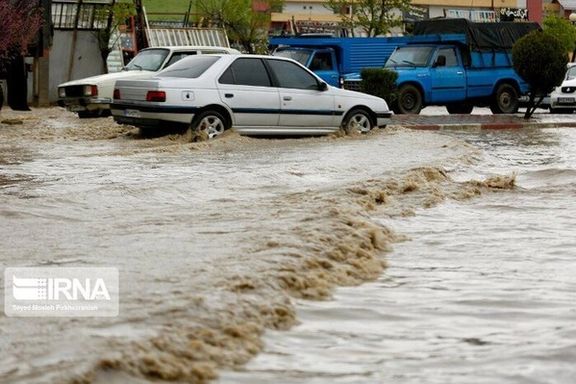
Floods have killed three people in Iran in the last 24 hours, according to the country’s Red Crescent.
Since Wednesday, six provinces of East Azarbaijan, West Azarbaijan, Ilam, Kordestan, Kermanshah and Lorestan have been in need of rescue services due to heavy rains.
Morteza Moradipour from the Red Crescent said 861 people in 11 cities and 21 villages have received rescue services so far. A further 385 people provided with emergency accommodation and 24 transferred to safe houses.
Shahin Fat’hi, CEO of the Red Crescent Society of Tehran warned about the possibility of flooding in some areas of the province saying that all rescue teams and operational centers in Tehran are on alert.
The massive flood in Iran took the lives of 62 people last year and dozens of others went missing. Indian sub-continent summer monsoons usually bring rain showers to Iran’s arid plateau, but every few decades the impact becomes more intense and causes flooding.
Partly due to the arid nature of the land and partly because of neglect in urban planning, even a modestly strong storm leads to deadly floods in Iran. Many dry riverbeds are choked off with construction or debris dumped by residents, leading to sudden flash floods in places no one expected.
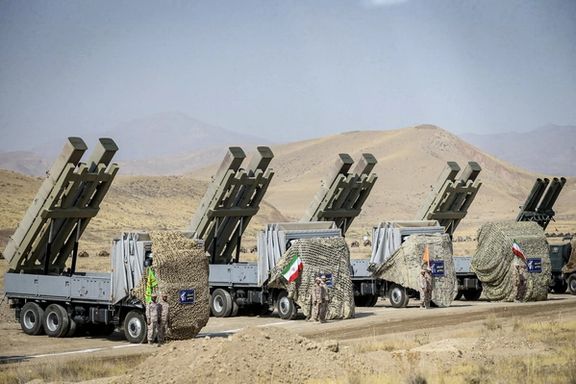
Iran’s Armed Forces issued a statement on Thursday claiming that the countdown to the collapse of Israel has begun.
It is the latest in a stream of anti-Israel propaganda released by the regime which is at fever pitch in rallying the Muslim world against its archenemy.
“Experience has shown that any compromise plan, including the normalization of ties between the Zionist regime and some Islamic countries, has failed, and the Islamic resistance is the only solution to the Palestinian issue,” reads the statement.
It was likely referring to the internal political division in Israel, with protests against the government's legislative reforms. Iranian proxies in Gaza, Lebanon and Syria have all recently attacked Israel with rockets as tensions simmer during the holy month of Ramadan.
A few years ago, Supreme Leader Ali Khamenei said Israel must be destroyed in 25 years and the government even set up a countdown clock in Tehran. Many Iranians mock the anti-Israel rhetoric and the ticking clock, but the regime is adamant in repeating its threat.
The latest statement was released on the eve of Quds Day, an annual event showing solidarity with Palestine and against the state of Israel. It was proclaimed by the founder of the Islamic Republic Ruhollah Khomeini in 1979.
In Iran, Quds Day also features demonstrations against other countries that the regime deems as enemies, including the United States, the UK and Saudi Arabia.